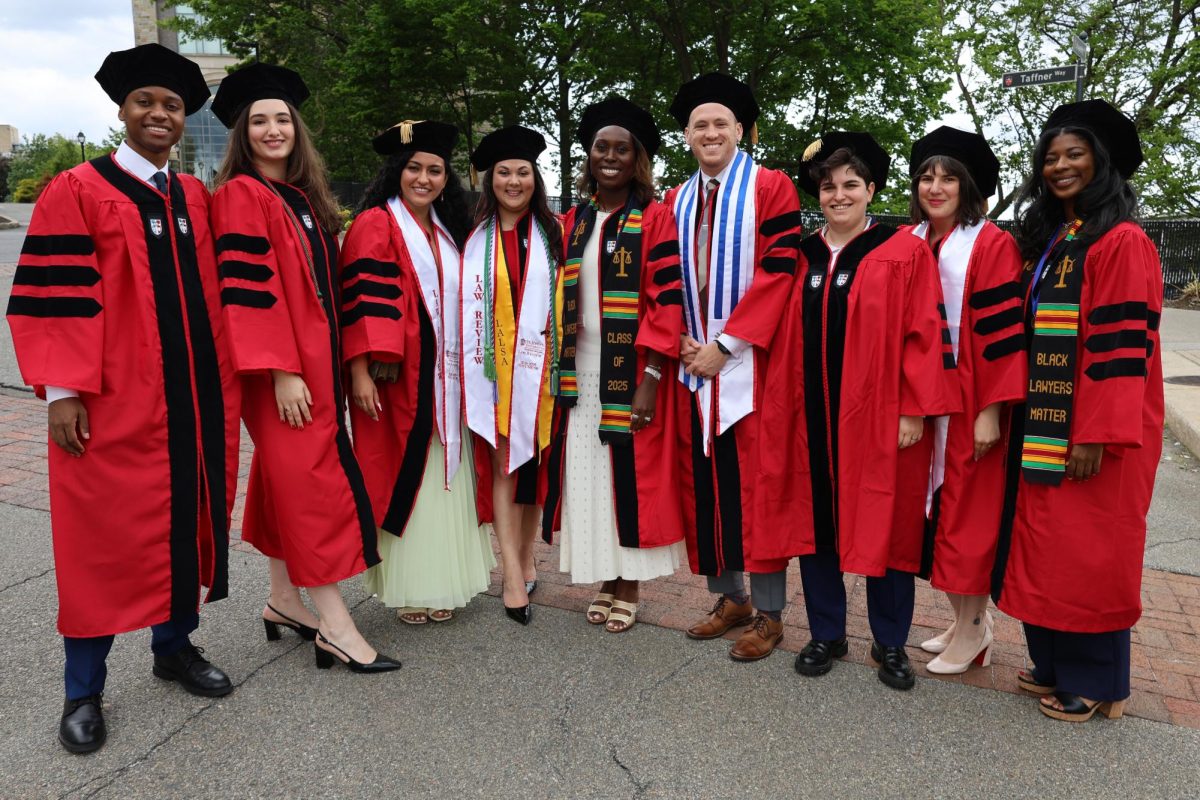Last fall, nine St. John’s Law 3Ls came together to discuss Pulitzer Prize-winning author Matthew Desmond’s Poverty, by America. The book challenges readers to examine systems and policies that perpetuate poverty in the United States and, taking on that challenge, the students shared their aspirations for promoting justice and equity as future lawyers.
That future came into sharper focus in April, when all nine students learned that they had passed the February New York Bar Exam, a milestone moment in the year they have spent as Pro Bono Scholars at St. John’s Law.
Established by the New York State Unified Court System in 2014, open to all New York law schools, and managed at St. John’s Law through the Public Interest Center, the Pro Bono Scholars Program allows students to devote the last semester of their 3L year to performing pro bono service for underserved and marginalized individuals and communities. St. John’s Pro Bono Scholars work full time in the Law School’s in-house and partner clinics. As an added benefit, they can take the February Bar Exam to accelerate their legal careers.
“The idea of doing full-time pro bono work in my final semester of law school really interested me,” says Rabab AlAjmi ’25. “I came to St. John’s knowing I wanted to participate in the Consumer Justice for the Elderly: Litigation Clinic, and the Pro Bono Scholars Program offered a the perfect opportunity to immerse myself in that clinic experience.” As she has advocated for the needs and rights of her clinic clients, AlAjmi has also benefited from a close working relationship with the clinic’s directors, Professors Ann Goldweber and Gina Calabrese. “It’s been inspiring to hear about their experience in law practice, and about the wisdom they have gained over their careers,” she says.
Like AlAjmi, Nathalie Lindor ’25 has enjoyed working full time in the Consumer Justice for the Elderly: Litigation Clinic through the Pro Bono Scholarship Program. “Participating in a clinic is rewarding because of the immediate positive impact you can have on people’s lives,” she shares. “We have clients that are targeted for scams and predatory schemes because of various factors, like their age, race, and socioeconomic status. Resolving their consumer issues so they can focus on what’s truly important to them, such as caring for their loved ones, is an incredible feeling.”
The prospect of having a full-time clinic experience and taking the February Bar Exam also appealed to Victoria Ciminera ’25, who spent the semester in the Law School’s Child Advocacy Clinic under the supervision of its director, Professor Jennifer Baum. “One of the main highlights of being a Pro Bono Scholar has been the hands-on experience I’ve received in the clinic,” says Ciminera. “I’ve conducted client interviews, attended court on numerous occasions, and spoken on the record before a judge. It’s also rewarding to see the impact our work has on our clients, and how grateful they are for our dedication as they navigate legal challenges. We’re truly saving lives and children’s futures with the work we do.”
As she completes her clinic hours and looks forward to graduating from St. John’s Law with her fellow Pro Bono Scholars and all their classmates, Nathalie Lindor takes pride in her accomplishments. “Pro bono work matters,” she says. “Advocating for those who can’t advocate for themselves matters. As I embark on my legal career, I know without a doubt that I’ll carry all that I’ve experienced in the Pro Bono Scholars Program with me at the helm of my journey and continue to make pro bono work a priority.”
End Note: In addition to Rabab AlAjmi, Victoria Ciminera, and Nathalie Lindor, St. John’s 2024-2025 Pro Bono Scholars cohort includes: Federico Curbelo ’25 (Refugee and Immigrant Rights Clinic); Talia Gal-Osher ’25 (Domestic Violence Litigation Clinic); Kipp Garrett ’25 (Bankruptcy Advocacy Clinic); Amber Joyner ’25 (Refugee and Immigrant Rights Clinic); Nadiyah Owens ’25 (Tenants’ Rights Advocacy Clinic); and Gabriella Schwartz ’25 (Child Advocacy Clinic).

